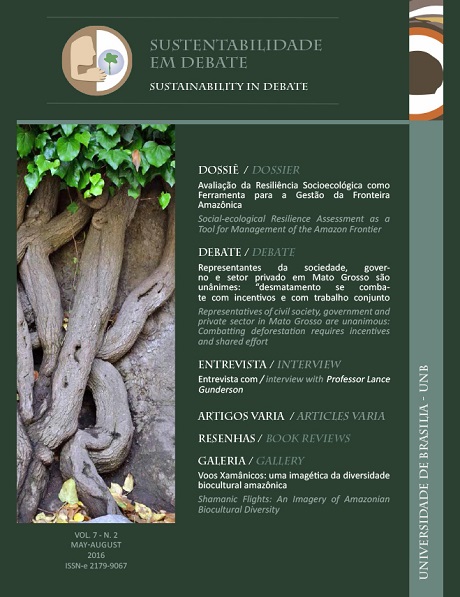Resilience in rural settlements:
an experience in northen Mato Grosso
DOI:
https://doi.org/10.18472/SustDeb.v7n2.2016.15320Keywords:
Resiliência, Agricultura familiar, Campesinato, Análise sistêmica, Desenvolvimento ruralAbstract
The aim of the study was adapt the resilience assessment methodology as a tool for strategic and operational planning of Instituto Ouro Verde (IOV), a nongovernmental organization that works to support family-based groups and farmers in northern Mato Grosso. The study was conducted in 04 stages: characterization of the family farmers production system, characterization of the groups involved in IOV, construction of future scenarios for family-based agriculture and developing strategies for action at different levels. The results pointed to the characterization of the family production mode from 04 dimensions: production matrix, work organization, perception of the role of the land and, finally, social organization, evidencing the existing variety of the family farming segment. From this diversity, the actions were set at different scales for the strengthening of the attributes considered essential for these farmers.
Downloads
References
BECKER, C.; ANJOS, F. S.; BEZERRA, A. J. A.. O impacto do programa de aquisição de alimentos da agricultura familiar na segurança alimentar e no desenvolvimento rural. Anais do 48o. Congresso da SOBER, Campo Grande, 25 a 28 de julho de 2009, 2010.
CONCEIÇÃO, S. G.. FRAXE, T. J. P.; SCHOOR, T. Agriculura familiar e capitalismo: desafios para a continuidade da categoria na amazônia. Anais do XIX Encontro Nacional de Geografia Agrária, São Paulo, 2009.
CUNHA, D. M.; SILVA, P. A.;CUNHA, D. M.; CUNHA, R. F. S. O avanço do capital sobre a floresta: uma análise dos processos de desterritorialização e favelização na Amazônia. Anais do XVI Encontro Nacional de Estudos Populacionais. Caxambu, 2008.
DELGADO, N. G. O papel do rural no desenvolvimento nacional: da modernização conservadora dos anos 1970 ao Governo Lula. In: DELGADO, N. G. Brasil rural em debate: coletânea de artigos. Brasília (DF): CONDRAF/NEAD, 2010, p. 28-78
DEPONTI, C. M. Teoria social e o lugar da agricultura familiar na sociedade contemporânea: estudo analítico ”“ comparativo das contribuições brasileiras ao debate. Anais do XLV Congresso da Sociedade Brasileira de Economia, Administração e Sociologia Rural, 22 a 25 de Junho de 2007. Londrina, PR. 2007.
GAZOLLA, M.; SCHNEIDER, S. Qual “Fortalecimento” da Agricultura Familiar? Uma análise do Pronaf crédito de custeio e investimento no Rio Grande do Sul, RESR, Vol. 51, Nº 1, p. 045-068, 2013.
RODRIGUES, M. F. F. Quem sabe faz a hora: a análise das estratégias de reprodução em Geógrafos da América Latina, 20 a 26 de Março de 2005, USP. p.12665 ”“ 12684.
S.E.A.C. - Swedish Environmental AdvisoryCouncil.Resilience and sustainable development. Stockholm: MinistryoftheEnvironment, 2010. 8p.
SANTOS, J. V. T. A reprodução subordinada do campesinato. Ensaios FEE, Porto Alegre, 02 (02), 1981. p.109-1997.
SCHOLES, R. J., BIGGS, C. P.; DURAIAPPAH, A.Assessing state and trends in ecosystem services and human well-being. Chapter 4 in: Ecosystems and Human Well-being: A manual for assessment practitioners. N. Ash, H. Blanco, C. Brown, K. Garcia, T. Henrichs, N. Lucas, C. Raudsepp-Hearne, R.D. Simpson, R.J. Scholes, T. Tomich, B. Vira, and M. Zurek (eds). Island Press: Washington DC, 2010.
WANDERLEY, M. N. B. O Brasil: agricultura familiar oulatifúndio? In: LAMARCHE, H. A. Agricultura familiar. Campinas: UNICAMP, (2), 1998. p.27 ”“ 31.
Downloads
Published
How to Cite
Issue
Section
License
SUSTAINABILITY IN DEBATE – Copyright Statement
The submission of original scientific work(s) by the authors, as the copyright holders of the text(s) sent to the journal, under the terms of Law 9.610/98, implies in the concession of copyrights of printed and/or digital publication to the Sustainability in Debate Journal of the article(s) approved for publication purposes, in a single issue of the journal. Furthermore, approved scientific work(s) will be released without any charge, or any kind of copyright reimbursement, through the journal’s website, for reading, printing and/or downloading of the text file, from the date of acceptance for publication purposes. Therefore, the authors, when submitting the article (s) to the journal, and gratuitous assignment of copyrights related to the submitted scientific work, are fully aware that they will not be remunerated for the publication of the article(s) in the journal.
The Sustainability in Debate Journal is licensed under Creative Commons License – Non-Commercial-No-Derivation Attribution (Derivative Work Ban) 3.0 Brazil, aiming at dissemination of scientific knowledge, as indicated on the journal's website, which allows the text to be shared, and be recognized in regards to its authorship and original publication in this journal.
Authors are allowed to sign additional contracts separately, for non-exclusive distribution of the works published in the Sustainability in Debate Journal (for example, in a book chapter), provided that it is expressed the texts were originally published in this journal. Authors are allowed and encouraged to publish and distribute their text online, following publication in Sustainability in Debate (e.g. in institutional repositories or their personal pages). The authors expressly agree to the terms of this Copyright Statement, which will be applied following the submission and publishing by this journal.








